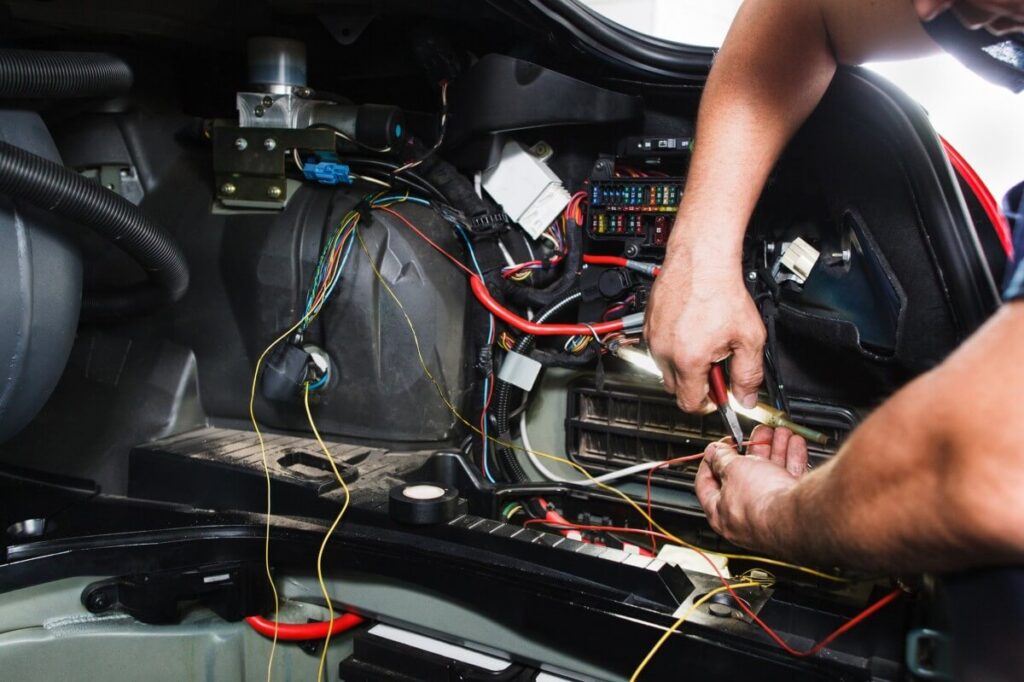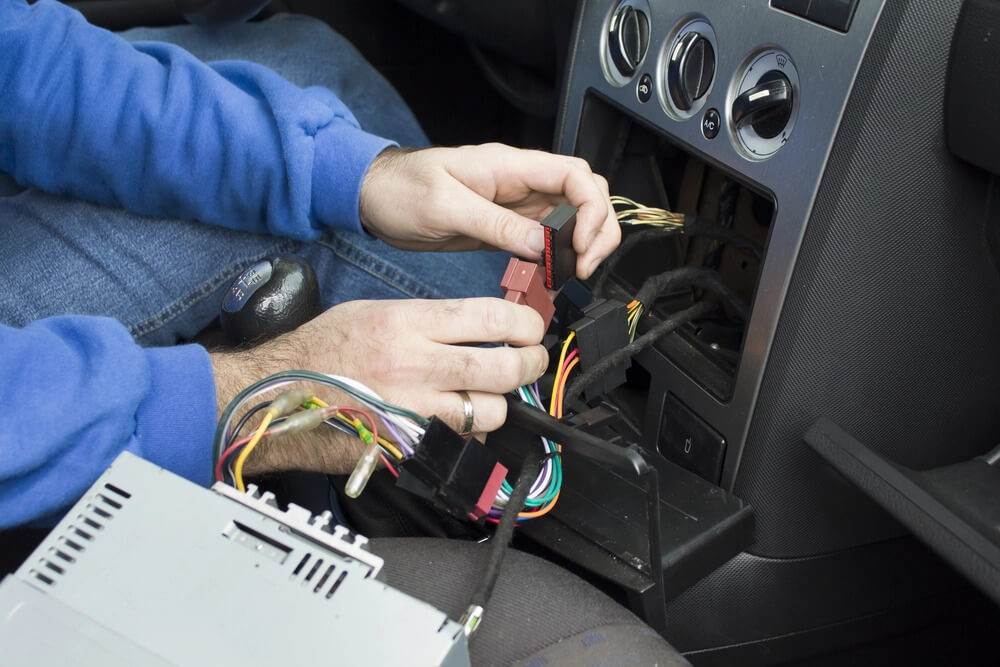Vehicles rely significantly on their electrical system due to its role in performing multiple functions. This crucial system controls the basics like rolling down windows to significant actions like engine ignition and charging.
As such, when the system develops a fault, it is almost impossible to use the car to execute your day to day activities.
Regardless of your vehicle’s make, age, or condition, electrical problems can occur anytime. In much older vehicles, the culprit is usually the battery.
Home » Resource Center » Electrical Problems: Major Signs, Types, and How to Fix Them
Recent technological advances bred many changes in vehicles to improve comfort and usability. However, the system became complex, providing more avenues for the electrical system to develop faults.
Electrical issues in a car could stem from the battery, alternator, or any other component, facilitating the need for car maintenance and repairs.
As a driver, your automobile can develop any of these electrical problems:
You might wake up one morning dressed for work and about to head out in your car only to insert the key into the ignition and realize the engine isn’t starting. When this situation arises, the problem is usually the starter.
As its naming suggests, the starter “starts” the vehicle. If this vital component malfunctions, the vehicle won’t come alive. While other electrical system components, like the battery and alternator, might work as intended, the car won’t move an inch if the starter is defective.
Usually, when you start your vehicle, the starter makes a clicking sound. The absence of this sound when you turn the vehicle on signifies there’s probably a problem with its starter. Therefore, you need to get the starter assessed by an experienced professional.
If you discover the starter is faulty, an experienced auto mechanic will determine if a repair or replacement is the best course of action to follow. To avoid having a problematic starter affect your daily schedule, take time to get your vehicle to an auto shop for routine electrical problems checks and maintenance.
Battery issues are typical electrical issues in vehicles. When your car battery is dead or faulty, you’ll hear the clicking sound from the starter when you turn the key in the ignition. As such, the engine won’t start.
At this point, other electrical components, like your car lights, can be working at this point.
Your car’s inability to start even when its starter clicks doesn’t occur only when the battery is dead. This event also occurs if the starter wiring isn’t tightly connected.
Problems with the battery can arise due to these:
Identifying electrical problems due to a dead battery isn’t difficult. Firstly, you’ll notice that your vehicle isn’t turning on when you turn the key. Furthermore, the car lights may be dim or won’t switch on at all.
Usually, a jump-start should fix the dead battery issue. However, make concerted efforts to ensure that battery fluid doesn’t touch your skin when doing a jumpstart as it’s corrosive.

If the electrical problem your vehicle is facing isn’t from the starter or the battery, look at the alternator for a possible cause. This car component is responsible for charging your vehicle’s battery and distributing power when the engine runs. Thus, if the alternator becomes faulty, the impact is significantly felt.
A defective alternator decreases power supply, which makes the car slow. Due to its inability to distribute charges, your vehicle’s electrical system fluctuates.
As such, you might notice several flickers in your car’s headlight while you’re driving.
Check the alternator in the event of a decrease in your vehicle’s power and speed. For your car to function at optimal levels, the defective alternator should be fixed as soon as possible.
Electrical problems in your vehicle can be due to spark plug issues. The spark plug powers up the piston, and if it becomes loose or gathers dirt, it’ll invariably affect your driving.
A loose or dirty spark plug leaves signs that drivers can notice quickly. Your car’s spark plug is most likely faulty when you notice any of these issues:
If you notice the aforementioned signs, call an expert to thoroughly assess your vehicle’s state. Although you can fix a spark plug issue independently, it’d be best to involve a professional mechanic for a proper evaluation and a more reliable fix.
Loose wires and a blown fuse box rank amongst the most typical electrical problems vehicles may develop. Usually, the fuse box will blow when it comes in contact with loose wires. Additionally, your car can quickly lose power due to wires hanging around.
When the fuse box blows frequently, it’ll be best to take the vehicle to a top-tier repair service for replacements. Always ensure that an expert does the job so you will avoid creating more problems for yourself.
When any system bears more than it can handle, the chances of failure are high. The same effect is possible when your car’s circuit receives more power than it can deal with. This scenario causes a short circuit.
A short circuit in your vehicle’s electrical system poses serious danger to the driver and other occupants as it can make your car burn or explode.
Due to grave short circuit dangers, it’s ideal to spot the problem early and nip it in the bud. Usually, perceiving a burning plastic type of odor indicates there’s possibly a “shorted wire” in the circuit.
At the first sign of a short circuit, make sure to send the car to a top auto shop for professional diagnosis and repairs. However, the best way to stay abreast of this problem and avoid any ugly occurrence is by regularly going for electrical problems car maintenance.
In some situations, a defective component of your car’s electrical system can cause battery drain, stopping the starter from igniting its engine. When this happens, the check engine light on the dashboard’s display appears, and your vehicle won’t come alive.
An engine’s failure to crank is common in old vehicles because, with age, the car’s rotary parts will most likely develop issues. On the flip side, your vehicle may have a difficult time starting due to a faulty fuel injector.
You can avoid this nagging problem by going routinely for car maintenance checks and repairs. Also, regularly cleaning the automobile’s throttle body and fuel injector will help start the engine faster.
However, assuming the problem has already occurred, contact a skilled auto mechanic to resolve it speedily.
Another electrical problem that can cripple your vehicle stems from faulty battery cables. These cables connect your vehicle’s battery directly to the electric system.
Therefore, power transmission to every part of your car gets cut off when this critical component is damaged, especially by corrosion. An expert will need to evaluate the problem and replace all damaged cables to restore regular power flow.
Due to the complexities of the electrical systems found in modern-day vehicles, they can develop a vast array of faults. Usually, these malfunctions can be missed or mistaken for another, making it challenging to solve the problem.
To accurately correct electrical problems, it’s pertinent to correctly identify the issues.
Here are the typical signs of a faulty electrical system:
A faulty electrical system may give off a smell similar to burning plastic. Once detected, focus on getting the car to an auto mechanic to avoid getting into dangerous scenarios that can ruin the car or cause bodily harm.
However, determining an electrical problem by picking up a burning smell depends on your sense of smell’s soundness.

Another way to spot an electrical problem is by peeking the fuse box. A car’s fuse prevents short circuits from happening. The fuse stops some electrical components from taking up too much current.
This vital car add-on can break for diverse reasons.
However, if it happens more often than usual, suspect a fault in the electrical system. If you’ve had a need to replace your fuse frequently, take the car to an expert to assess the issue. Allowing this problem to linger will only damage the vehicle in the long run.
Vehicle lights are vital for safe driving. With headlights, turn signals, or brake lights, drivers can seamlessly communicate with one another to ensure safety on the roads.
On the flip side, interior lights make it possible to find things within the vehicle with ease.
Electrical problems often affect the various lights in a vehicle. Usually, the lights may go dim, signifying a low voltage or battery charging failure. However, corrosion or a malfunctioning alternator belt might just be the root causes in some instances.
If a car’s battery is dead or discharged, there’s a high chance an electrical problem is behind it. But instead of hurrying to facilitate a battery replacement, query other possible electrical issues.
Still, it could be that the battery is only old and needs replacement after years of service.
Check for corrosion and tight connections when there’s a likely battery problem. If the vehicle doesn’t start, get a top auto mechanic to test the battery’s functionality. If the car battery is in good working condition, inspect the alternator and other parts that face electrical problems.
Clicking sounds during ignition occurs when there isn’t sufficient electric current to start the car’s engine. The development often signifies the battery has no charge or is close to its lifespan of about 5 years. Nonetheless, the problem can also be from the alternator or starter.
Regardless of the causes, ensure that you immediately take the car to an expert to pinpoint the problem and resolve it correctly.
Electrical problems pose a severe challenge to driving. These concerns can single handedly affect the course of your entire day. On the other hand, driving a car with such issues exposes the automobile to grave damage. The occupants of the vehicle can also sustain serious injuries.
Identifying electrical problems is daunting and more so in modern vehicles with an elaborate electric system featuring some components.
Electrical problems can occur in the battery, alternator, battery cables, fuse box, spark plugs, etc. Problems in these components make the car hard to start and drive to your preferred destinations as intended.
Since electrical problems are diverse, precisely nailing down the particular issue with the car or the defective part proves challenging.
However, it’d be best to grasp the different symptoms to know when to seek help.
Usually, electrical problems feature tell-tale signs like a burning plastic smell, frequent battery issues, clicking sound during ignition, impaired lights, and blown fuses.
Once you spot any, take the vehicle to a reputable auto shop to resolve the nagging issue as soon as possible. Nonetheless, you can avoid this trouble by constantly taking your vehicle for routine electrical problems car maintenance.
When going for maintenance to help your automobile’s electrical system “stand the test of time,” it’ll be in your best interests to settle for a reputable auto shop rather than variations with unsavory reviews.